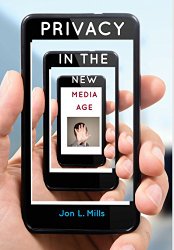$29.95
$15.27
(SAVE Now!)
as of 12/22/2024 (Details)
“An essential book for anyone concerned with the increasingly ubiquitous clashes between a technologically borderless world, free press, safety and personal privacy.”—Charlotte Laws, board member, Cyber Civil Rights Initiative “Elucidates a path that both enhances dignity and protects essential press liberties. This is a much needed work in our new media age, where forced disclosure and technology have converted transparency from a disinfectant into a bludgeon.”—Chris Hoofnagle, Berkeley Center for Law & Technology “An original look at old and new media versions of the clash between privacy and freedom of the press.”—Anita Allen, author of Unpopular Privacy: What Must We Hide? “The almost-anything-goes Internet, which enables anyone to be a publisher, alters both the definition of a journalist and the meaning of privacy. This book arms both traditional journalists and citizen-journalists with a clear description of the murky boundary between the rights to publish and to privacy in our brave new media era.”—Norman Lewis, University of Florida “The cases presented here range from politics to popular culture and violent crime and demonstrate the global complexity of related privacy issues, which are made even messier by the advent of new technologies.”—Melody A. Bowdon, coeditor of Higher Education, Emerging Technologies, and Community Partnerships “Explores possible modernization of the intrusion tort, calls for greater weight to be placed on human dignity interests, suggests redefining personal space to fit our times, and offers multiple approaches for recalibrating the delicate balance between press freedom and privacy rights.”—Clay Calvert, coauthor of Mass Media Law Balancing personal dignity and first amendment concerns has become increasingly challenging. In today’s new media age, technology moves faster than the law, enabling modern media outlets to commit intrusions into private endeavors for the sake of a story. With few legal limits governing the dissemination of information online, individuals—whether news affiliates or anonymous writers—can become publishers, freely divulging the details of citizens’ private lives. While the history of free speech and press has noble origins rooted in democratic theory, unlimited and unrestricted internet speech has left thousands of victims in its wake. Can society protect those who are harassed, stalked, and misrepresented online while maintaining our constitutional freedoms? Jon Mills, one of the nation’s top privacy experts and advocates, maps out this complex problem. Tracing the history of the press in tandem with its regulation, Mills argues that technology has always evolved more quickly than the laws restricting its use. Old laws chase new media, raising original questions of how privacy and modern news outlets can coexist. Mills tackles those issues by looking at solutions already implemented by the European Union and comparing them to the obsolete privacy laws still extant in the United States. In his search for solutions, Mills closely examines an array of noteworthy cases, including suits made by Jennifer Anniston, Kate Middleton, Naomi Campbell, Argentinian soccer star Diego Maradona, and the family of deceased SeaWorld trainer Dawn Brancheau. In a global marketplace of instantly shared ideas, freedom of expression offers consumers a wealth of knowledge, but a lack of gatekeeping threatens intellectual space and individuals’ personal lives. Mills traces that sharp edge between the right of privacy and the right of the public to know—between the limitless source of private information and society’s craving for it all.
Technical Details
No features available.